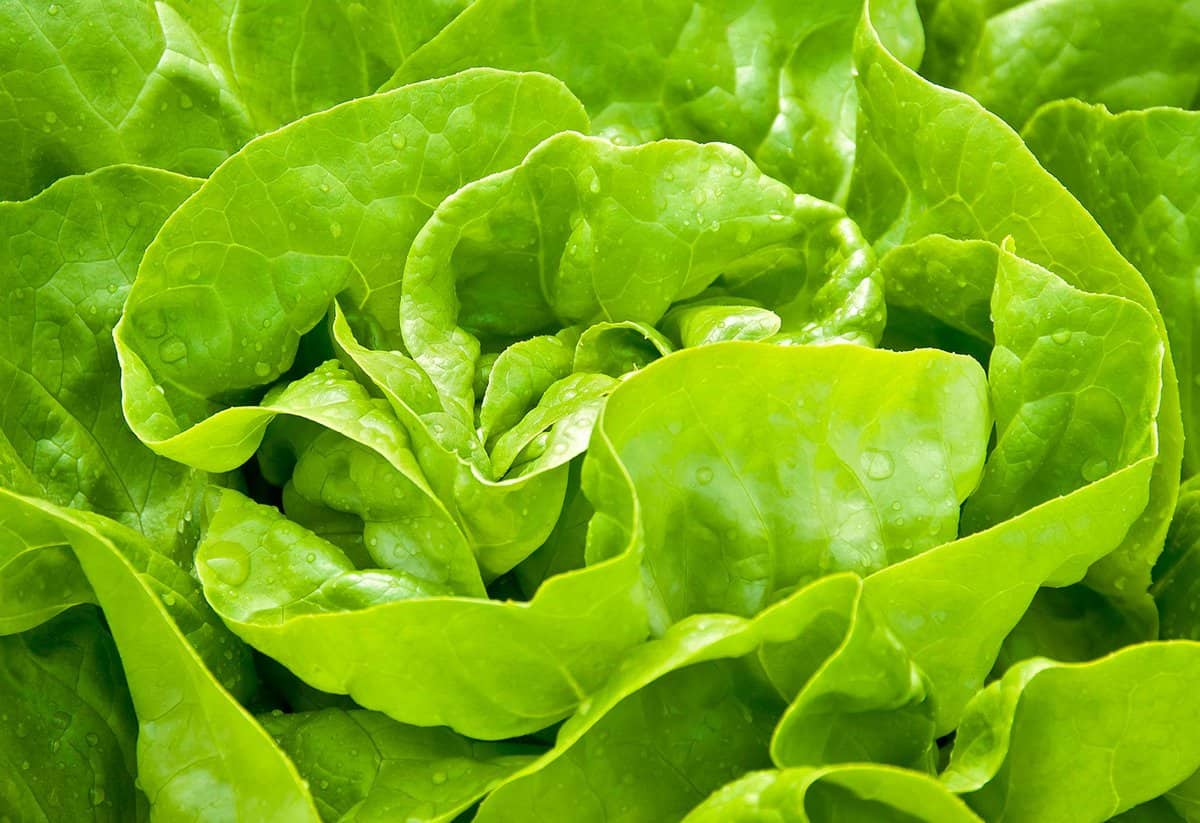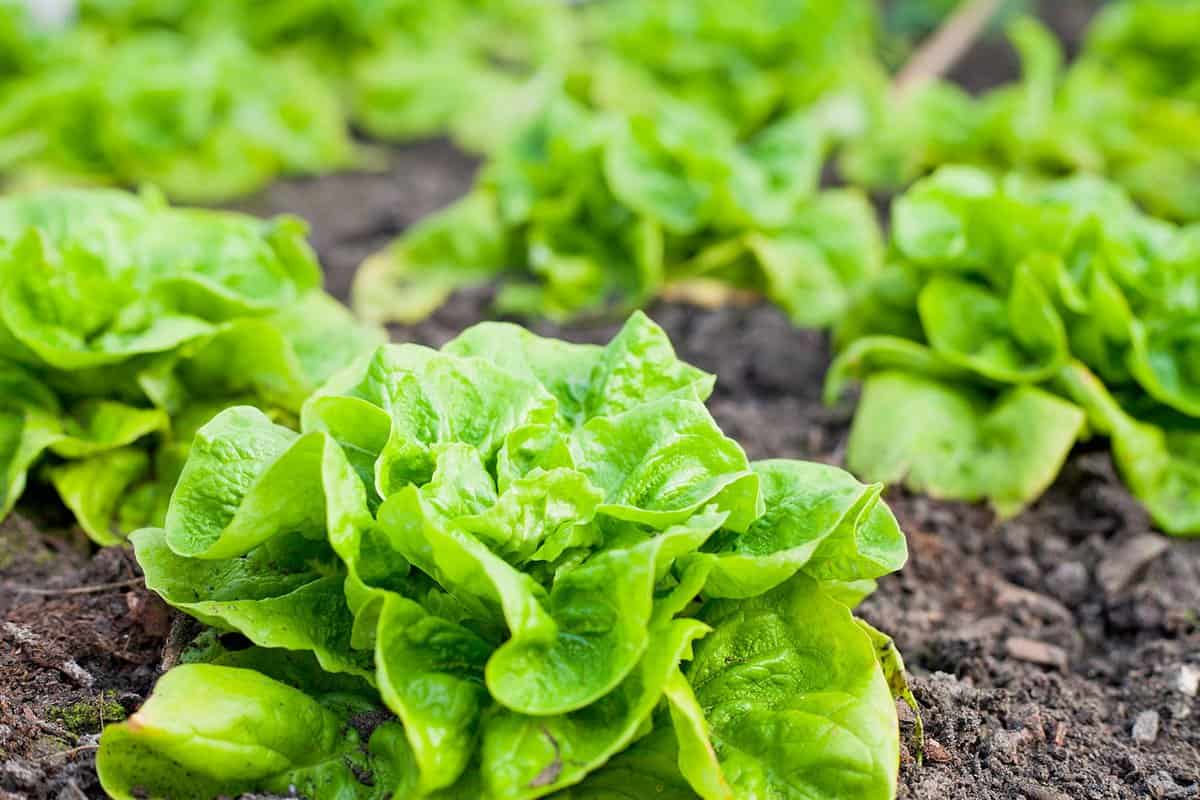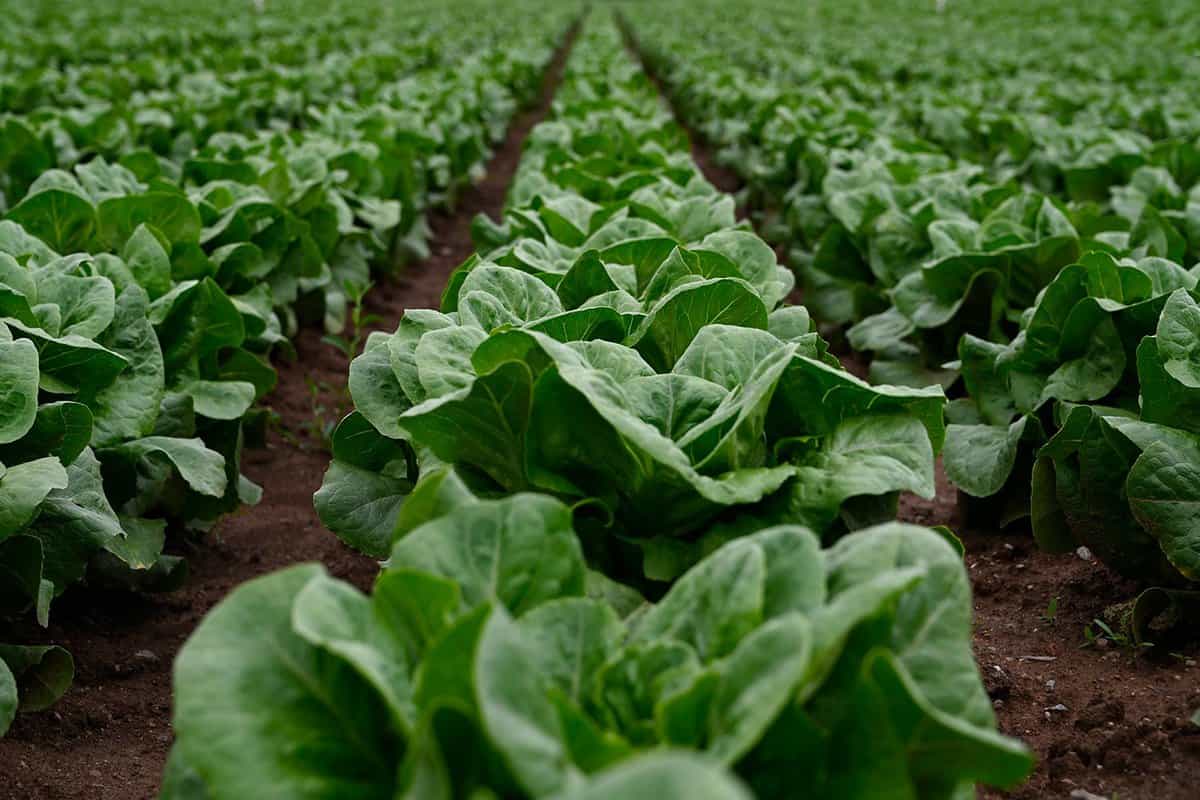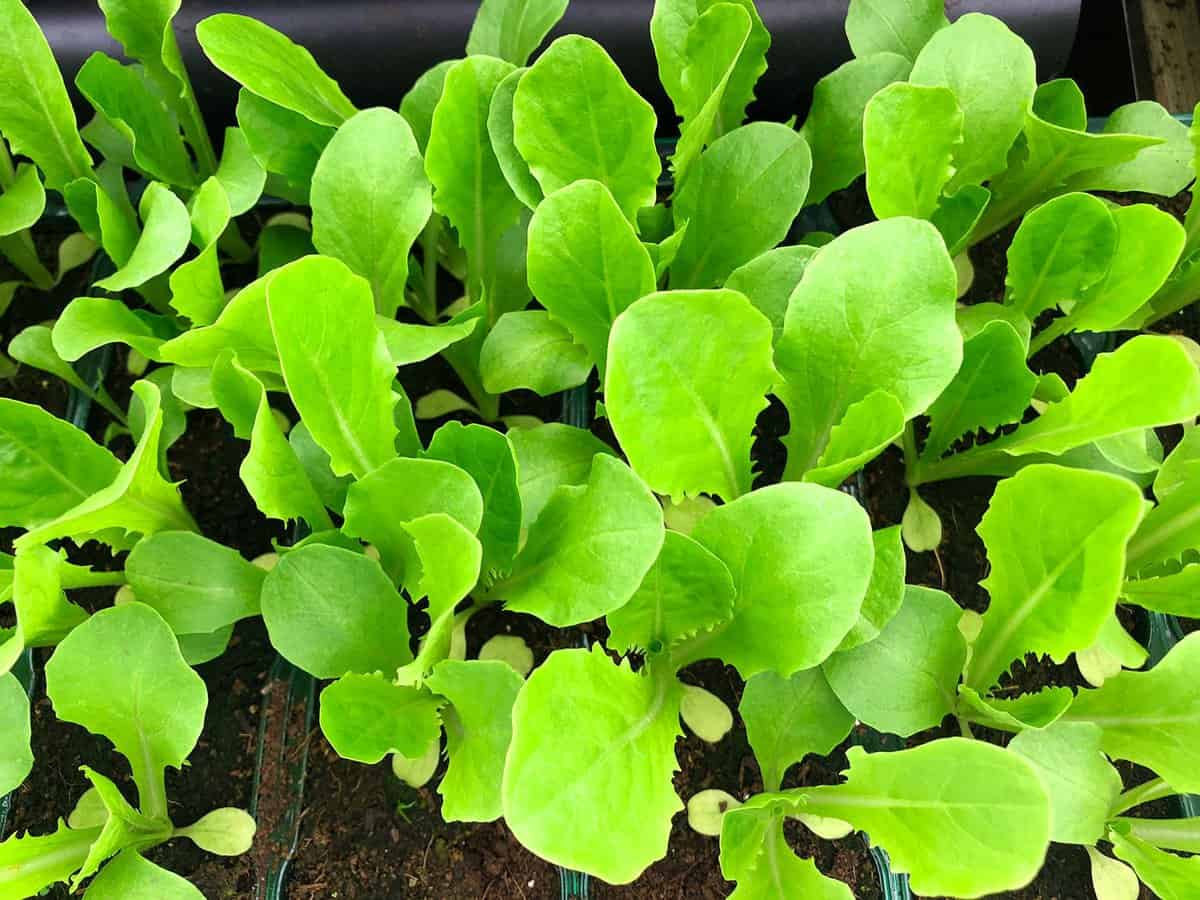Realizing the plants in your garden don't handle cold weather well can be devastating. Did it drop below freezing outside recently, and you aren't sure if your lettuce will make it? Can lettuce survive a freeze? Well, we have done extensive research into this topic and have the answers below. Let's discuss!
In general, lettuce will be able to tolerate a few freezing nights/days. However, this vegetable doesn't do well with constant "hard" freezes, meaning the temperature drops below 28 degrees Fahrenheit.
If your lettuce undergoes multiple freezes in the same week or even season, you could see it start to die. We recommend using plant covers for colder nights to prevent this, which should keep the frost away from your greens.
As we begin, we will cover all things lettuce and discuss how to handle colder winter weather. Whether your lettuce is newly planted or more mature, there are ways to keep it from freezing. With that said, let's dive right into this post!
![Frozen green lettuce leaves, Can Lettuce Survive A Freeze? [And How To Prevent It From Dying]](https://gardentabs.com/wp-content/uploads/2022/06/Can-Lettuce-Survive-A-Freeze-And-How-To-Prevent-It-From-Dying.png)
How Cold Can Lettuce Get?
Because this vegetable is frost-hardy, lettuce should handle the cold pretty well. Typically, your plant can survive light freezes, meaning the temperature drops between 28 and 32 degrees.
As we mentioned, lettuce doesn't handle climates below 28 degrees Fahrenheit well. You risk losing your lettuce if the weather consistently drops to negative digits or reaches under 28 degrees.
When lettuce gets too cold, the frost from outside essentially freezes the cells of your greens. That can be devastating to lettuce and even kill it before spring hits.
Something to remember is that once lettuce freezes multiple times, this is irreversible. That means if it drops to ten or even 20 degrees throughout the wintertime, your lettuce won't likely survive.
Therefore, you want to cover your lettuce with a tarp in colder temperatures or wait to grow it until a warmer season.

What Happens If My Lettuce Freezes?
A few things can happen if you run into an extreme cold spell and lettuce freezes. As we covered, once temperatures drop below 28 degrees, the freezing temperatures can attack your vegetables at a cellular level.
When this occurs, frost forms inside the cell wall of your plant, which will usually kill it. With that said, freezing won't always kill a lettuce plant.
If it is a freak weather condition and your plant can warm up the next day or two, you may be able to salvage it. Again, this all comes down to the climate immediately afterward.
However, you don't want your frozen lettuce to warm up too quickly. Considering there will be frost inside and outside your plant's cell wall, fast heating can cause it to explode.
Of course, you're not going to see plants combusting in your vegetable garden, but they will look pretty bad. Ideally, you will grow lettuce somewhere with milder, warmer winters to prevent freezing altogether.
You can also try growing your lettuce inside under a heat lamp if you have severe wintertime weather, so there are ways to get around this.
Where Is The Best Place To Grow Lettuce?

For anyone wanting to grow lettuce in their yard, you want to consider a few things. Most importantly, does your garden get plenty of sunshine?
Plenty of sun exposure is one of the most vital components for healthy lettuce. Ideally, lettuce should get direct sun for 6-8 hours per day, regardless of the season.
Another thing to consider is the climate where you live. Is it super cold for months on end? If so, you may want to consider growing your lettuce indoors.
Soil is another big one. Specifically, lettuce prefers moist, well-drained soil to grow in, which isn't always possible depending on your location.
According to the US Department of Agriculture, Arizona and California are the top states in the nation for lettuce growing. That is thanks to the states' warm year-round climates and good soil conditions.
That said, you can grow lettuce in most places. Luckily, it is somewhat cold tolerant, as long as it doesn't freeze constantly.
Is It Better To Grow Lettuce Somewhere With Warm Winters?

Surprisingly, lettuce does best in places with cool winters. Although you don't want your plants freezing, lettuce can handle moderate cool temperatures and prefer them.
However, lettuce doesn't like cold seasons that last more than a few months. For example, if the weather where you are is bitterly cold for 4-5 months out of the year, you don't want to grow lettuce.
On the other hand, if the weather where you live is warm all four seasons, your lettuce may not enjoy that either. Remember, the more moderate the summers and winters, the better lettuce will grow.
As mentioned above, California and Arizona are great locations for year-round lettuce growing and harvesting. Between the two, California will be less hot during the summer while also getting colder during the winter.
Again, that's not to say you can't grow lettuce in Nevada, Florida, Texas, or even parts of Colorado; it simply depends on the year-round climate in your growing zone.
Does Lettuce Grow Well In Cold Weather?

Yes and no. Generally, lettuce does enjoy a cool-off period, which will be between December and March. With that said, your lettuce doesn't like freezing temperatures or cold for too long.
For that reason, growing lettuce isn't always so easy. Ideally, you want to plant lettuce somewhere bright throughout the four seasons and ensure it has good draining soil.
On top of being cold-hardy, lettuce can also handle periods without much watering. So if it's winter and the rain isn't coming, your crops should be okay between waterings.
Adversely, you will need to make sure your lettuce has plenty of hydration when the warmer spring weather hits, so it does take some adjusting.
Will Lettuce Grow In 50 Degree Weather?
Yes, you can grow lettuce in 50-degree weather. That said, it is better to grow lettuce in climates closer to 60-70 degrees on average, but again, cooler temperatures shouldn't cause an issue.
According to Southern Living, lettuce tastes sweeter if you grow it in the cold. They also mention how lettuce is a fall-friendly crop and does best in that season.
In addition, lettuce is also a good crop for springtime, as the weather is too hot or too cold. As we mentioned earlier, lettuce loves moderate temperatures and consistency.
The less dramatic weather changes, the sweeter and greener your lettuce will be, so that's something to remember. Furthermore, if lettuce gets too hot for days or even weeks, it can go to seed.
That is when your crop becomes gangly, often losing its fullness and leaves altogether.
With current weather becoming hotter across the nation and world, farmers have to get creative with where and how they grow their lettuce.
How Often Should You Water Lettuce?
Figuring that lettuce will have shallow roots, you want to water it frequently. As we said, lettuce prefers moist soil and great drainage.
Many experts recommend giving your lettuce water twice a week throughout the year. You may have to up your schedule if it's a hot, dry summer.
Additionally, if your lettuce is newly planted, you may need to water it every other day. Of course, this depends on the weather and how wet the dirt is around your plant.
According to The Spruce, frequent watering is better than deep watering for lettuce plants. So rather than drenching your crops in water once a week, it is better to water them lightly 2-3 times.
If you give lettuce too much water, it can bloat, often becoming susceptible to root rot.
Is Lettuce Drought Tolerant?
Yes! Lettuce is surprisingly drought tolerant. As we mentioned above, lettuce can handle periods of less or no water and shouldn't go into any significant shock aftward.
Of course, that's not to say your lettuce likes being water-free, but if you want to conserve water during the summer, you can lessen the amount you use for irrigation.
Furthermore, lettuce can handle heat pretty well. Like colder temperatures, your lettuce will withstand hotter climates much better than other vegetables.
For this reason, lettuce is popular around the globe and is farmed in places that might surprise you. That said, it's better to lightly water lettuce once or twice a week rather than drench or neglect it, so moderation is key.
Is Lettuce Easy To Grow?

Overall, we would agree that lettuce is easy to grow and harvest. Typically, as long as you give your crop good draining soil, full sun, and moderate summer/winter weather, it will thrive.
Again, you can't always control the weather, so it's inevitable for something to happen. If it freezes, the best thing you can do is cover your plants with a tarp and let them slowly defrost.
If your lettuce goes through a prolonged drought or severe heat wave, an extra light watering won't hurt. Another fun fact about lettuce: some varieties reach maturity in as little as 30 days.
You can also harvest lettuce much faster than other vegetables and microgreens, hence its popularity.
To Wrap It Up
Whether you have lettuce growing outside or want to start a vegetable garden, it's always good to know what weather conditions it can handle. From what we found, lettuce is cold-tolerant, meaning it should be fine in temperatures down to 28 degrees Fahrenheit.
Lettuce is also a cold-growing species, often being sweeter if you harvest it during the fall-spring. Furthermore, your lettuce can handle periods of drought and heat; overall, it's a great plant to grow.
Regardless, cover your lettuce if the weather calls for freezing temperatures, and don't be afraid to cut back on watering yours during the warmer summer months.
Made it to the end? Check out these helpful related garden posts below!
